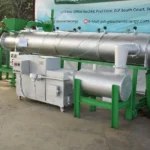Background
India generates 990 MMT of agricultural biomass annually, with 230 MMT surplus, of which 92 MMT is burned, causing smog, health issues, and climate change (NPMCR, 2019). Improper crop residue management wastes valuable resources, while excessive use of synthetic fertilizers and pesticides further degrades soil health by disrupting pH balance, reducing microbial diversity, and causing nutrient runoff and water pollution. Sustainable alternatives like biochar production can help address these challenges by reducing emissions, improving soil fertility, and supporting climate-resilient agriculture.

Production Process
The biochar production process involves pyrolysis, where agricultural biomass (crop residues, husks, straw, etc.) is heated in a low-oxygen environment at temperatures between 300°C to 700°C. This process converts biomass into biochar, along with by-products like syngas and bio-oil. The resulting biochar is then cooled, collected, and can be used to improve soil health, sequester carbon, and reduce emissions
.jpeg)
Benefits of Biochar:

Environmental Benefits: Biochar reduces air pollution by replacing open biomass burning with controlled pyrolysis, lowering harmful emissions. It improves soil health by enhancing water retention, nutrient availability, and microbial activity, leading to 15–25% higher crop yields. Biochar also helps mitigate climate change by sequestering up to 2.5 tons of carbon per ton of biochar, reducing GHG emissions.
Social Benefits: Biochar production creates rural employment in plant operations, logistics, and maintenance. It supports economic development by generating new business opportunities in biomass supply and agri-services. Additionally, it promotes sustainable farming, improving community health and well-being.
Economic Benefits: Biochar enables carbon credit revenue due to its carbon sequestration potential, attracting investments. The process also produces renewable energy (bio-oil and syngas), which can be used to sustain plant operations, making the system economically viable.
Carbon Credit Potential
A carbon credit represents the reduction or removal of one metric ton of CO₂ or equivalent GHGs, used to offset emissions. Biochar helps generate carbon credits by sequestering carbon in the soil while improving soil fertility, water retention, and microbial health. Carbon credits are earned through carbon-absorbing or emission-reducing projects, such as biochar, reforestation, or renewable energy. In the voluntary carbon market, credit prices range from USD 2–50, while high-quality projects with added social or environmental benefits can reach USD 100–110+ per credit.







